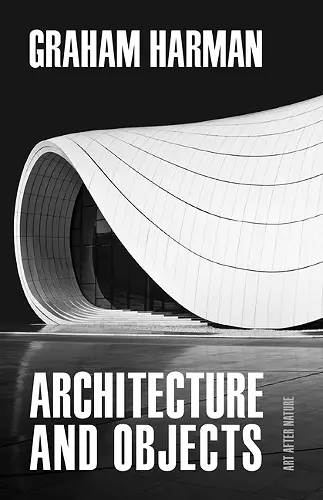Architecture and Objects
Format:Paperback
Publisher:University of Minnesota Press
Published:26th Jul '22
Should be back in stock very soon
This paperback is available in another edition too:
- Hardback£86.00(9781517908522)

Thinking through object-oriented ontology—and the work of architects such as Rem Koolhaas and Zaha Hadid—to explore new concepts of the relationship between form and function
Object-oriented ontology has become increasingly popular among architectural theorists and practitioners in recent years. Architecture and Objects, the first book on architecture by the founder of object-oriented ontology (OOO), deepens the exchange between architecture and philosophy, providing a new roadmap to OOO’s influence on the language and practice of contemporary architecture and offering new conceptions of the relationship between form and function.
Graham Harman opens with a critique of Heidegger, Derrida, and Deleuze, the three philosophers whose ideas have left the deepest imprint on the field, highlighting the limits of their thinking for architecture. Instead, Harman contends, architecture can employ OOO to reconsider traditional notions of form and function that emphasize their relational characteristics—form with a building’s visual style, function with its stated purpose—and constrain architecture’s possibilities through literalism. Harman challenges these understandings by proposing de-relationalized versions of both (zero-form and zero-function) that together provide a convincing rejoinder to Immanuel Kant’s dismissal of architecture as “impure.”
Through critical engagement with the writings of Peter Eisenman and fresh assessments of buildings by Rem Koolhaas, Frank Gehry, and Zaha Hadid, Architecture and Objects forwards a bold vision of architecture. Overcoming the difficult task of “zeroing” function, Harman concludes, would place architecture at the forefront of a necessary revitalization of exhausted aesthetic paradigms.
"Graham Harman’s Architecture and Objects could very well be a new philosophical blueprint for how to build our emerging twenty-first century world. By reconsidering the relationship between humanity, reality, and the built environment, he shows us, like a UV light at a crime scene, ways of understanding architecture that we’d never even considered but that are now, all of a sudden, glowing with brilliant potential."—Mark Foster Gage, Yale University, and principal of Mark Foster Gage Architects
ISBN: 9781517908539
Dimensions: 216mm x 140mm x 25mm
Weight: unknown
208 pages